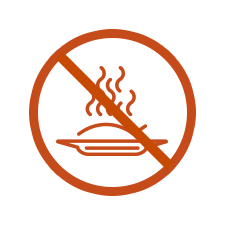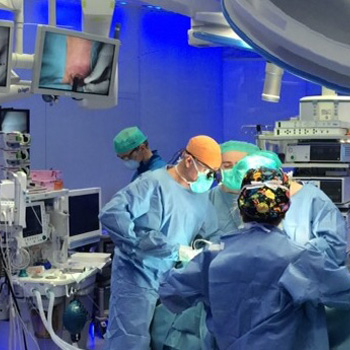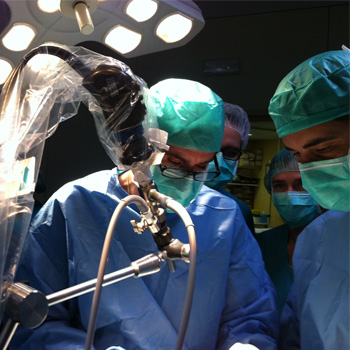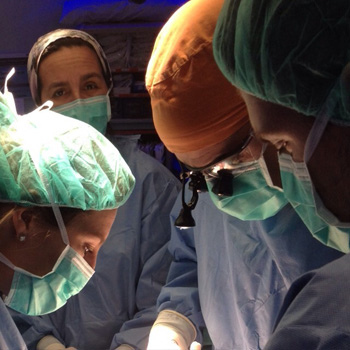The Unit of thyroid surgery and other endocrine glands of barnaclínic+ offers you the possibility to make an appointment with our center over the Internet. Once you have made your request, we will contact you, trying to respect your preferences.
Thyroid pathologies
The Thyroid may develop a disorder. Although the majority of these dysfunctions can be treated medically, on occasions it is necessary to operate to remove the thyroid. This is the case with some thyroid nodules, large multinodular goiters, hyperthyroidism (excessive function of the gland) and thyroid cancer.
Some situations in which the doctor may recommend thyroid surgery are:
· A small tumour (nodule or cyst) in the thyroid
· An overactive and dangerous thyroid gland (thyrotoxicosis)
· Thyroid cancer
· Benign tumours in the thyroid gland which are causing detrimental symptoms
· Inflammation of the thyroid that hinders breathing and/or swallowing
Thyroid Surgery
Operations on the thyroid gland are usually performed under general anesthesia.
Advice and indications for surgery

Before the operation
The patient should carry on with their life with complete normality, whilst trying not to get overly tired.
In the 6 hours prior to the surgical procedures they cannot ingest solid food or liquids.

After the operation
Pain
The patient must take analgesics and light anti-inflammatory medication for one week. Doing so, we can keep pain in the area of the wound to a minimum. In the majority of cases, the patient will only manifest some neck discomfort.
Prevention of Hypocalcemia
The patient should take calcium for a few days. With this we will enable the parathyroid glands to rest and they will have a better chance of recuperation from the aggression produced to the thyroid cell during the operation to remove the thyroid.
Hormone replacement
Depending on the type of operation performed, through analysis the doctors will establish whether the patient will need hormone replacement with thyroid hormones, in cases where the patient has had a total thyroidectomy, the medication will begin the day after the procedure. Initially, the patient will be administered an orientated dose depending on their weight, which can be modified depending on their metabolic activity.
Weight Management
The alteration in the weight (gain) is a direct consequence of the deficit of the thyroid hormones and the inactivity caused by the postoperative period. Our aim will be to maintain the patient's hormone levels to a correct level despite the surgical intervention.
Common transitional complaints
· Change in the quality of the voice.
· Some dysphonia
· Inability to scream
· Mild sore throat when swallowing saliva
· Some difficulty in swallowing
· Sensation of mucus in the throat
· A somewhat irritant cough
· Itching in the wound area
When you leave the Hospital
During the first week the patient should partially rest and avoid both physical effort as well as straining the voice.
From the second week onwards the patient will be able to return to to their everyday activities in a progressive manner.
In most cases, the patient will be able to return to their normal activities from the third week after the operation.
Protect the wound with a scarf or high neck until the surgeon instructs you otherwise.
Thyroid expert
How to Find Us
Blog (spanish)

Cáncer de tiroides: Qué es, tipos, síntomas y tratamiento
El cáncer de tiroides es una enfermedad que puede manifestarse como un único nódulo tiroideo o en el contexto de un bocio multinodular que se desarrolla a lo largo de los años. En este artículo, abordaremos no solo los tipos de carcinomas tiroideos, sino también sus síntomas del cáncer de tiroides, sus factores de riesgo […] La entrada Cáncer de tiroides: Qué es, tipos, síntomas y tratamiento aparece primero en Blog de tiroides | Dr. Óscar Vidal.

La glándula tiroides: qué es, para qué sirve, enfermedades y tratamientos
La glándula tiroides, localizada en la parte anterior del cuello, es una estructura delicada pero crucial para el correcto funcionamiento del cuerpo. La principal función de la tiroides es la secreción de hormonas que regulan la temperatura corporal, el metabolismo energético, el apetito, el sueño y el estado de ánimo. Debido a su fragilidad, es […] La entrada La glándula tiroides: qué es, para qué sirve, enfermedades y tratamientos aparece primero en Blog de tiroides | Dr. Óscar Vidal.

¿Qué es el Bocio Multinodular de Tiroides?
El bocio multinodular de tiroides es una condición en la que la glándula tiroides crece de manera irregular debido a un estímulo anormal de la hormona hipofisaria TSH (hormona estimulante de la tiroides). Esta alteración provoca la formación de múltiples nódulos en la tiroides, generalmente resultando en un aumento del diámetro del cuello. Es una […] La entrada ¿Qué es el Bocio Multinodular de Tiroides? aparece primero en Blog de tiroides | Dr. Óscar Vidal.




